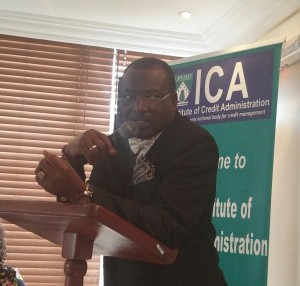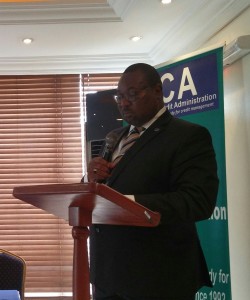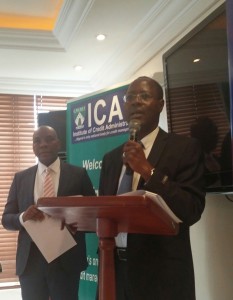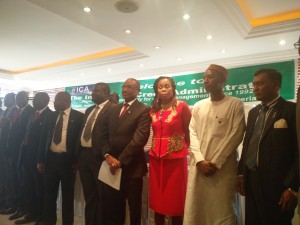An interesting read…
Enjoy the thought provoking paper delivered by Chief M. K. Ajayi JP. (FNIM, FCIS, FCIDA, FICA, ACIPM) General Manager, Western Ports, Nigerian Ports Authority at the induction of new members of the Institute of Credit Administration on August 20, 2016 at Westwood Hotel, Ikoyi, Lagos.
NIGERIA’S ECONOMY AND WAY FORWARD
Nigeria’s economy took its taproot from the historical emergence of Nigeria as a nation. Prior to the amalgamation of 1914, the area called Nigeria today engaged in slavery and slave trade with the Europeans.
The people of this area were arrested and exported to work in the sugar plantations in Europe and the Americas. Following the abolition of slave trade, there emerged a new trade in oil palm and other cash crops. The emergence of this new trade encouraged the local people to engage in peasant agriculture for sustenance and export. With the expansion of what was often regarded as legitimate trade, the European countries engaged in a mad rush to acquire colonies and areas of influence in Africa to ensure a sustained and seamless flow of raw materials for their industries back at home. The mad rush for the acquisition of colonies was legalized and regulated by the Berlin Conference of 1884 – 1885.
The annexation of Lagos in 1861 and the amalgamation of 1914 invariably led to the establishment of Political and economic structures by the British overlords. Indeed the British colonial government encouraged massive development of agriculture while at the same time developed infrastructure such as roads and rail lines to link major cash crop producing centers.
From the foregoing, it can be safely said that the colonial economic policies shaped the future independent Nigeria’s economy to a large extent. Between 1951 and 1960, Marketing Boards were established in the regions to manage the proceeds of agricultural exports for the regional government and the farmers.
The major feature of post-independent Nigeria’s economy was its over reliance on revenue from oil export.
Prior to the discovery of crude oil at Oloibiri in the Niger Delta region of Nigeria in 1956 by Shell–BP, the mainstay of Nigeria’s economy was agriculture, which was propelled mainly by peasant and mechanized farming. The revenue from the export of cash crops such as cocoa, coffee, groundnut, cotton etc. provided a source of funding to the colonial government and early post-independent Federal government.
The end of the civil war in 1970, which coincided with the rise in the price of crude oil worldwide, instantly provided the military government an easy source of revenue. While the earnings from oil should have been a blessing, for Nigeria it became a curse somehow. It engineered political instability as Nigeria’s military elite engaged in coups and counter coups ostensibly to have a share of the national wealth. Suddenly, there emerged an era of big government with massive layers of bureaucracy. State and local government creation became an attractive enterprise as each military government competed to outdo each other. The proliferation of states and local governments funded by oil revenue encouraged corruption as both the military elites and its civilian allies brazenly pilfered unabashedly from the national till. Agriculture was abandoned so also was mineral exploration and exportation.
PROBLEMS WITH NIGERIA’S ECONOMY
Recently, Nigeria’s economy has been saddled with myriads of problems. These problems are multifaceted and had been examined by several authors. Indeed hardly will a day pass without it being discussed at the level of intellectuals and the level of the market women, husband and wife, parents and their offspring etc. several governments both at the state (regional) and federal levels in their respective domain have approached this problems in so many ways, leading to several post independent conferences, ad-hoc committees, such as Vision 2010, 2020, 2040, 2050, 2070 etc.
Much as these problems have attracted intense attention, little has been achieved by government to solve Nigeria’s economic problems. The resultant failure to address it honestly and painstakingly has often resulted in several industrial crisis involving labour and non labour unions, perennial school closures, depreciating quality of infrastructure, unemployment and underemployment including social problems such as armed robbery, kidnapping, piracy, crude oil theft and bunkering etc.
For a country with so much potential and supposedly the largest economy in Africa, it is rather disheartening that our leaders are yet to get it right in improving the economic future of Nigeria.
One fundamental problem facing the growth of Nigeria’s economy is corruption both at the high and low levels of governance. According to the corruption perception index (CPI), published by Transparency International, Nigeria was ranked 143rd out of 183 countries surveyed. The relocation of firms out of Nigeria to neighbouring countries is the consequence of corruption. The Brookings Institution (2007) noted in its report thus; “a bane of Nigeria’s existence since the oil boom of the 1970s has been the reputation for corruption, largely petrified, but also partly the result of perception. Corruption and poor governance affected growth and public service delivery in Nigeria in various ways. Corruption distorts the climate for doing business and serves as a tax on private investments. In a corrupt environment, resources for human capital and other needed investments such as infrastructure, health and education are often diverted. There are various ways in which this may occur; including procurement, fraud, patronage for access to services, absenteeism and misuse of facilities…”. In the words of O. O. Olaniyi et al (2014), “Corruption has devastating effect on the nation, reduces our citizens to poverty and deprives the nation of sustainable development”.
The current national Government rode to power on the crest of routing out corruption and its vestiges. It has consequently taken serious efforts at combating the menace. Of recent, we all woke up to discover the massive and mind-boggling diversion and theft of $2.1 billion meant for the procurement of arms to prosecute the war against Boko Haram – a local religio-terrorist organization headquartered at the North-Eastern axis of Nigeria. We have also read on the pages of newspapers how some military chiefs diverted huge sums of money meant for the rank and file to purchase dollars at Bureau De Change. We are also witnesses to the diversion of public funds to private pockets by State Governors and other public officials, even bank officials have been mentioned as willing accomplices in several probes by Nigeria’s Anti-corruption Agencies.
In fact,we could attribute the inability to put our refineries in order to Corruption. Nigeria was reported to have imported N17 trillion worth of petrol between 1999 and 2015. This amount is enough to establish a minimum of fifty modular refineries and halt the importation of petrol as well as the incidental twin problem of corruption and crude oil theft. This will also help to retain in the economy the forex gained via the sale of crude oil.
In looking at or talking of the problems of Nigeria’s economy, I must not fail to mention the inclement climate of doing business in Nigeria. This poses peculiar challenges not only to aspiring entrepreneurs but also to already established local and foreign investors – year to year.
Both state and federal government officials often cry for lack of foreign direct investment (FDI), the question is, how would Nigeria be attractive to FDI if the business climate is hazardous. Even where we get some FDI, the resultant hard currency meant for investment are stolen and taken back to where such monies emanated from leaving international investors bewildered. According to the most recent World Bank report, Nigeria ranked 169th out of 189 countries surveyed in the ease of doing business. With an estimated population of 180 million people, Nigeria ought to be the regional hub of business and industry. Huge population and enabling purchasing power command huge markets for any prospective investor but that seems not to be the case. It is rather disheartening to observe that Nigeria trails behind countries like Lesotho, Sierra Leone, Togo and Zimbabwe among others on the ratings of countries by the World Bank on regulations that enhance business activities and those that encumbered them.
While Nigeria’s regulations and business environment are unfriendly to foreign and local investors, the absence of stable energy remains a major stumbling block to rapid industrial growth in Nigeria. Although Nigeria has expended over $20 billion on energy, the result of this huge investment does not reflect in the output of energy supply, the privatization of Power Holding Company of Nigeria (PHCN) notwithstanding.
Again, taking a look at the recent World Bank report under the Getting Electricity Category, Nigeria ranks 182nd out of 189 countries showing a decline from last year’s 181st position of all the countries surveyed. South Africa for instance boasts of over 45,000 megawatts of electricity for her estimated population of 52 million. In the case of Nigeria with all our huge investments, electricity output fluctuates between 2,500 megawatts and 5,000 megawatts. It is shameful to state that this low output is what is available for domestic and industrial use in a country of an estimated population of 180 million people. Due to the inadequate power supply, most industries resort to the use of generators, which tend to escalate the cost of production and increase the prices of goods thereby making locally produced goods uncompetitive in terms of cost. To avoid the huge cost and rather unstable energy supply, most industries striving to survive have relocated to neighbouring countries with more stable and cheaper energy supply. Those that could not relocate died a ‘natural death’. This was the fate of most textile industries in Nigeria who went comatose because of the prohibitive cost of production arising from high energy cost.
Further to the above, is the poor access to credit facilities by small-scale industries from Commercial Banks. Nigeria’s Commercial Banks have been found to be interested in only giving out short-term credit. The lending approach is unhelpful to SMEs and small businesses who are in dire need of long-term credit facilities for growth and expansion. In spite of Central Bank’s policies on lending to ease out the stress of SMEs and small businesses through access to credit facilities at low interest rate, it is discovered that government policies are ineffective to deliver on this goal.
THE WAY FORWARD
With the gloomy picture of Nigeria’s economy as stated earlier which is reflected largely in poor infrastructure, poor road network, inadequate power supply, deteriorating level of education, corruption at all levels, closure of small, medium and large industries, abandonment of agriculture, massive unemployment and under-employment, low income, import dependent economy, the rise in crimes such as armed robbery, kidnapping, assassinations, youth restiveness, poor leadership, massive devaluation of the Naira occasioned by low revenue from oil export; it is quite necessary at this point to begin to examine the way forward.
Firstly, Nigeria must immediately begin to diversify its economy by embarking on massive agricultural programmes capable of reigniting the production of cash crops such as cocoa, coffee, cotton, cashew nuts, groundnuts etc. for export with improved added value to enable the generation of adequate revenue.
Secondly, government must come up with a concise strategy for the exploration and exportation of solid minerals. The illegal minings and theft of solid minerals must stop. The present government has taken some bold steps in this regard, at least through the creation of Ministry of Solid Minerals and the appointment of a Minister of cabinet rank in charge of this. Economic analysts believe that solid minerals if properly managed can provide a major source of foreign exchange to government.
Thirdly, there is hardly anything that can be achieved if the power situation remains as it is presently. This calls for a re-examination of the privatization of PHCN. The new owners have not been able to improve energy supply capable of driving the economy. Hardly can the new owners boast of five hours of uninterrupted power supply. Nigeria’s economy cannot move forward under the present circumstance of lower energy supply.
Consequently, a new approach and a new thinking must be brought to bear in the energy sector. New and alternative sources of energy such as wind and solar must be examined. State government must revert to the establishment of rural electrification board to reduce the load on national grid and encourage rural development, which in turn would stem rural urban migration.
Fourthly, government as of necessity must strengthen anti-corruption agencies such as EFCC and ICPC etc. with improved logistics and requisite funds to enable these agencies stem the tide of corruption in the country. Better remuneration and welfare packages should be looked into to enable the employees of these agencies perform their duties unhindered. As a corollary to this, government should look into the establishment of anti-corruption tribunals to try corruption cases. These special courts will facilitate speedy dispensation of justice.
Fifthly, the constant devaluation of the naira since 1985 to date has been unhelpful in redressing the distortions in Nigeria’s economy. Nigeria has vacillated from Second Tier Foreign Exchange Market (SFEM) in 1985 to Foreign Exchange Market (FEM) and now a floating currency exchange system. The present structure of Nigeria’s economy does not support devaluation by any stretch of intellectual imagination and thinking.
The devaluation of a currency is primarily adopted to reduce the price of a country’s export while increasing the price of its imports. If this is an acceptable underlying principle of devaluation, it is assumed that a country desirous of devaluing its currency must have an expansive export base of either manufactured goods or agricultural cash crops or both capable of being sold on a massive scale to generate the much needed forex. At the same, the high price of its imports is expected to discourage huge imports. A low import tends to reduce pressure on forex thereby conserving a nation’s foreign currency earned.
In the case of Nigeria, there seems not to be any gain derived from successive devaluation of the naira because the nation’s export base in both agriculture and manufacturing is weak and cannot generate the needed forex on the short run. The only item that has expansive export base capable of generating huge forex for Nigeria is crude oil.
Unfortunately, Nigeria is a member of the Organization of Oil Producing Countries, OPEC, which limits every member country to a restricted quota that cannot be expanded to enable Nigeria enjoy the dividends of devaluation. Please note that under OPEC, no nation can reduce or increase the prices of its crude oil far above the OPEC dictated range. We are compelled to ask the voodoo economists how can Nigeria gain on the short run from the devaluation policy of government. Nigeria can neither expand production, reduce nor increase the prices of its crude oil which constitutes 95% of its gross earnings.
Little wonder then, the current devaluation of the naira under a floating exchange regime designed to attract more forex in to the economy has achieved nothing but rather it has brought misery, double digit inflation(16.5%), high interest rates and closure of factories.
As a way forward, if we must continue to devalue the naira, then we must pull out of OPEC to enable us enjoy the fruits of devaluation.
Further to this, government may consider the redenomination of the naira and at the same time come up with a new currency to replace the current one. This was done in Turkey and Romania in 2005, Argentina in 1992, Russia in 1998, Germany in 1923, Bizone / Trizone in 1948 and Ghana in the nineties. This approach will enable the Central Bank of Nigeria to suck in the naira that has been hidden in farms and septic tanks in to the banking system hence enabling the CBN to systematically inject the required quantity of money into circulation and perform its regulatory function effectively and efficiently.
CONCLUSION
In the light of the foregoing, the leadership at all levels of government needs to adopt some of the already highlighted suggestions as a panacea to redressing the distortions in Nigeria’s economy so as to put the nation on the fast track of sustainable growth and development.
Thank you.
Chief M. K. Ajayi JP. (FNIM, FCIS, FCIDA, FICA, ACIPM)
General Manager, Western Ports, Nigerian Ports Authority
REFERENCES
Bolaji Samson Aregbesola: Nigeria’s Economic Crisis: The Way Forward
Nabudere, et al (1997) “Beyond Modernization and Development”
National Planning Commission (2004): National Economy and Empowerment Strategies (NEEDS) Abuja, Nigeria
National Bureau of Statistics (NBS): Nigeria Poverty Profile Report, 2010. Press Briefing by the Statistician-General of the Federation, 13th Edition
Nigerian Institute of International Affairs Vol 26, Nos 7 – 8. July / August 2005
Olayiwola O. Olaniyi & Titilola S. O. (2014): Growth Without Development in Nigeria: Issues and Way Forward
The Punch Editorial (May 9, 2016) Nigeria’s Tough Business Terrain














Wonderfully stated my friend!
Nigeria’s economy must move forward…but not with this same crop of VIP (vagabonds in power) we have been keeping in power to keep depressing and oppressing the Nigeria’s economy since the discovery of oil as a major export.
These “oppressive wolves” in Agbada and previously in military uniforms and candidates they endorse are the people Nigerians should never see as an option to pilot this great country to her desired economic height.
God bless you! God bless Nigeria with fantastic young leaders come 2019…#seeyouatdetop
Thanks Bethel. It is our responsibility to make the changes we desire.
Great piece. Diversification is the only solution I see as every other ‘solution’ can be easily politicized.
Thanks Sam